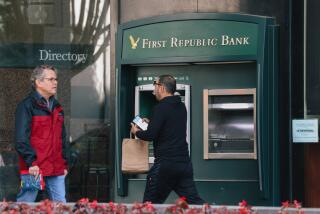Credit conditions have improved, Geithner tells TARP watchdog panel
Reporting from Washington — Forceful government actions, including the $700-billion bank rescue fund, have created an environment where credit conditions are no longer an obstacle to economic recovery, Treasury Secretary Timothy F. Geithner said Tuesday.
“Credit conditions overall, which dragged our economy into a deep recession in 2007, no longer pose an obstacle to growth,” Geithner said in testimony before the Congressional Oversight Panel for the Troubled Asset Relief Program.
“I don’t think on the available evidence today you can say that the financial system itself is operating as a significant drag on the recovery,” Geithner said.
Elizabeth Warren, chairwoman of the watchdog panel, and Geithner remain at odds over the issue of credit, however.
Warren’s panel has previously said that TARP might have stopped the global financial meltdown but that it hasn’t lived up to its promise of stimulating credit availability.
Warren said she was worried that “thousands of small banks could capsize” as a result of what she saw as a coming tidal wave of losses from the commercial real estate sector. By the end of the year, she said, about half of $1.4 trillion of commercial real estate loans will be underwater, meaning the property is worth less than the loan balance.
Warren also said that six of the 19 biggest banks hold commercial real estate loans that exceed 100% of their Tier-1 capital — the benchmark for measuring a bank’s capital adequacy. So-called stress tests of banks conducted by the government only cover losses through 2010, she noted.
Embroiled in controversy from the time it was created, the TARP fund is scheduled to expire at the end of this fiscal year, after which the government will only seek to exit from remaining investments — notably in Citigroup Inc., American International Group Inc. and General Motors Co.
Geithner estimated that TARP would end up costing taxpayers $105 billion.
He indicated that the Obama administration had no plans for any new programs under TARP to help small or big banks grapple with losses from their commercial real estate loans.
Geithner also said commercial real estate loans will be a continuing challenge to banks. However, bank losses are doing better than projected under the stress tests, he said.
In making the case that the availability of credit has improved, Geithner cited surveys indicating that banks have finished tightening credit standards. The cost of small-business loans is lower than it was going into the crisis, he said.
In addition, Geithner said delinquencies for many loan categories appeared to have peaked.
Declining loan balances at banks, Geithner said, reflect “a natural and healthy adjustment as borrowers and lenders de-leverage after a period of aggressive credit expansion.”
By the same token, “it does mean that many consumers and businesses are still finding it difficult to get new credit,” he conceded.
In his remarks, Geithner said the Treasury planned to sell its remaining stake in Citigroup by the end of the year. The government has already sold roughly 20% of its Citigroup holdings.
Geithner said the Treasury expected to recover its equity investment in General Motors when the Detroit automaker, which emerged from Chapter 11 bankruptcy protection last July, launches an initial public offering later this year or in 2011.
Robb writes for MarketWatch.com/McClatchy.
More to Read
Inside the business of entertainment
The Wide Shot brings you news, analysis and insights on everything from streaming wars to production — and what it all means for the future.
You may occasionally receive promotional content from the Los Angeles Times.










